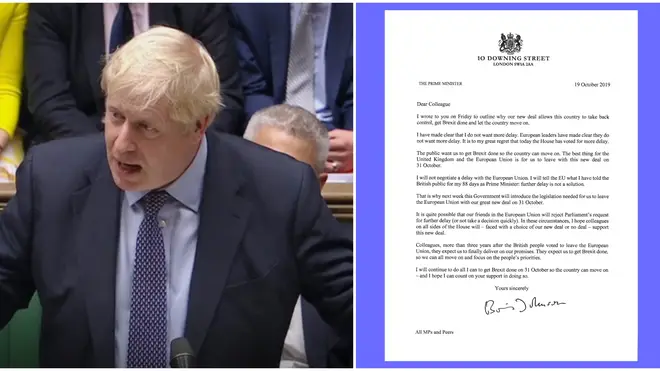
Clive Bull 1am - 4am
20 October 2019, 08:34
Boris Johnson, after being forced by law to send a letter seeking an extension from the EU, actually sent three letters last night. But what happens next?
Jill Rutter, a senior fellow from the Institute of Government, told Andrew Castle what to expect.
Andrew Castle asked Jill Rutter: "Is this vote on Monday something that's actually going to happen now?I wonder if you could explain where we are?"
Jill replied: "I think probably on balance not - but who knows? It's down to the speaker to decide whether the government is just asking MPs the same question they asked him on Saturday.
"Remember, when Theresa May tried to do that, he said, no, you can't have the same question twice in the same session. We're now in a new parliamentary session. No prospect of starting another one in the next next 24 hours.
So I think it's quite likely the speaker will say no, just get on with it. And then the real action will move to Tuesday, when the government is going to introduce the legislation to give effect to its deal, which is really the main event anyway."

Andrew Castle then asked how the EU's reaction to Boris Johnson's letter requesting an EU extension comes into things.
Jill explained how the EU has a meeting on Sunday morning in Brussels where EU ambassadors will decide how to react. She added, however, that the EU seems to "sort of be on Boris Johnson's side" because it has done a deal that it views to be "very good".
She continued: "So I think one of the things they may very well do is not given an answer before they see what happens in Parliament this week. We may even have to wait for next weekend.
"Or it could go right down to the wire. The EU, remember when Theresa May got her second extension in April, she got it two days ago before crash out day.
That's the nearest we've come so far to leaving the EU with no deal. So they may decide that actually, keep MPs hanging for a bit is the best way to exert pressure."
Andrew Castle then asked how likely it is that the EU might not grant an extension and brought up the possibility of Macron vetoing it.
Jill replied: "I don't think it would be Macron, at the end of the day, who would do that. I know there's sort of attempts to get the Poles and the Hungarians, people are talking about would they veto an extension. But actually, member states will sort of hang together on this.
"One of the things that the EU has always wanted to do is avoid blame for what happens and no deal causes disruption here. It also causes disruption within the EU. And I think that at the end of the day, that would mean that the EU, however reluctantly, would say yes to an extension.
"Whether it says yes to the same extension that Parliament has got Boris Johnson to ask for, that's not clear, and it may come with a bunch of conditions.
Remember last time they gave an extension, but she had to take off the European Parliament elections?"
Andrew then asked if Boris Johnson having refused to sign the letter of extension means anything.
Jill replied that it "doesn't matter a bit" because it is still a "request from the government". All it could do, she says, is making Boris Johnson look a bit "churlish".
Andrew then asked if the subsequent letter, laying out why Boris Johnson does not want a delay, might matter.
Jill said: "We'll find out tomorrow whether he gets in trouble with the courts for that letter, because he's not any supposed to comply with the law but he's also not supposed to try to frustrate it, but it looks to me as though that's been pretty heavily tested with government lawyers."
She added that prorogation proves that the government lawyers don't always get it right though.
Jill Rutter and Andrew Castle then discussed the absence of legal advice and economic impact assessments of a no-deal Brexit and of a potential deal.